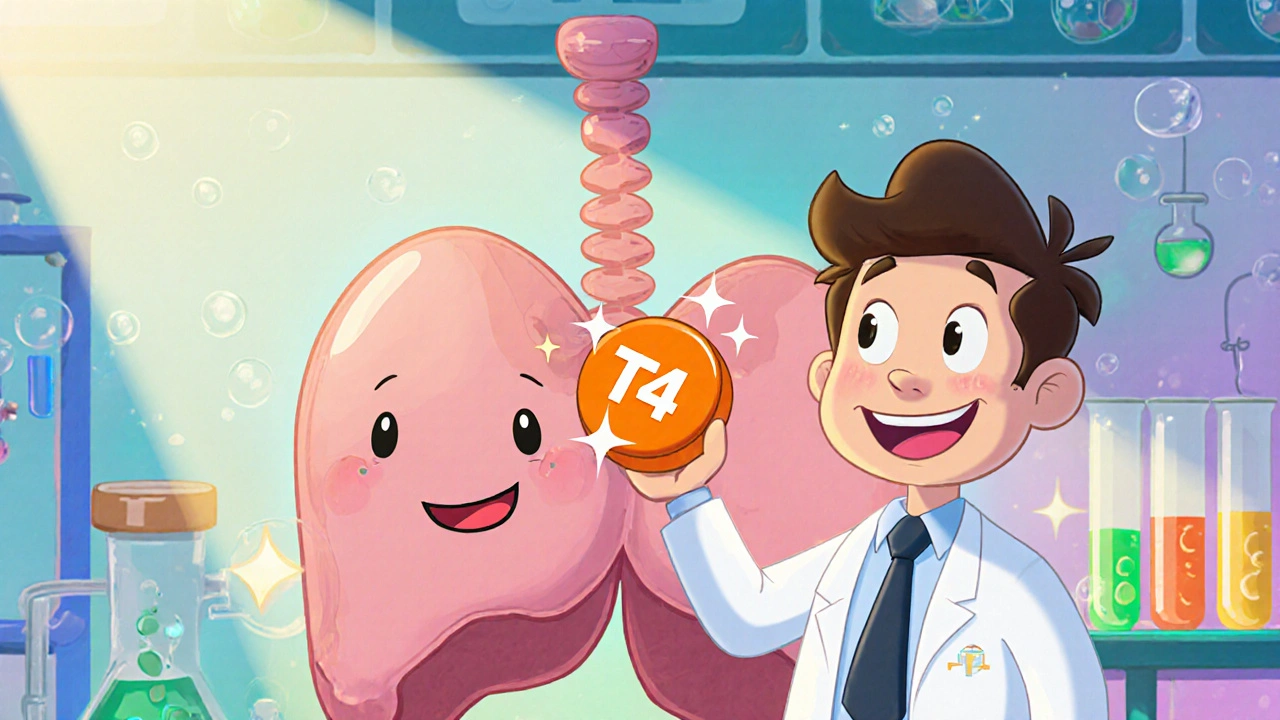When treating an underactive thyroid, Levothyroxine is a synthetic form of the thyroid hormone T4 (thyroxine) used to restore normal hormone levels. This medication is the cornerstone of therapy for anyone diagnosed with hypothyroidism, whether the cause is autoimmune, surgical, or medication‑induced.
Key Takeaways
- Levothyroxine replaces the missing hormone T4 and normalises metabolism.
- Dosage is highly individual - start low, adjust based on TSH blood tests.
- Take it on an empty stomach, usually 30‑60 minutes before breakfast.
- Food, supplements and some drugs can interfere with absorption.
- Regular monitoring prevents overtreatment and reduces side‑effects.
What Is Levothyroxine?
Levothyroxine is a levothyroxine tablet that mimics the natural hormone thyroxine (T4) produced by the thyroid gland. The thyroid releases two main hormones - T4 and triiodothyronine (T3). Most of the body’s T3 is actually converted from T4, so providing a steady supply of T4 is enough to keep metabolism, heart rate, and temperature regulation on track.
How Levothyroxine Works in the Body
Once swallowed, the tablet dissolves in the stomach and the active ingredient is absorbed mainly in the small intestine. After entering the bloodstream, it travels to cells throughout the body, where enzymes convert a portion of it to T3. The hormone then binds to receptors in the nucleus of cells, turning on or off genes that control energy production, cholesterol metabolism, and even mood.
Who Needs Levothyroxine?
Hypothyroidism can arise from several sources. The most common is Hashimoto's thyroiditis, an autoimmune attack that gradually destroys thyroid tissue. Other triggers include thyroid surgery, radioactive iodine treatment for hyperthyroidism, certain medications (like lithium), and congenital defects. Anyone whose blood test shows a high thyroid‑stimulating hormone (TSH) level alongside low free T4 is a candidate for levothyroxine therapy.

Dosage & Administration
Finding the right dose is a bit of trial and error. Doctors typically start with 25‑50 µg per day for older patients or those with heart disease, and 100‑150 µg for otherwise healthy adults. The goal is to bring the TSH into the target range (usually 0.4‑4.0 mIU/L, though some guidelines aim for 0.5‑2.0 mIU/L).
- Take the tablet with a full glass of water.
- Wait at least 30 minutes before eating or drinking anything other than water.
- Stay consistent - take it at the same time each day.
- Report any symptoms of over‑ or under‑replacement to your clinician.
Food can dramatically affect absorption. Calcium supplements, iron, soy products, and high‑fiber meals bind the hormone and reduce its uptake by up to 40 %. If you need these nutrients, schedule them at least four hours apart from your dose.
Monitoring Your Treatment
Regular blood tests are the only reliable way to gauge therapy success. The standard panel includes:
- TSH - the primary marker; it should fall within the target range.
- Free T4 - confirms that enough hormone is circulating.
- Sometimes Free T3 - useful if symptoms persist despite normal TSH.
Most doctors re‑check labs every 6‑8 weeks after a dose change, then space out to every 6‑12 months once stable.
Side Effects & Risks
When the dose is right, side effects are rare. Over‑replacement can cause symptoms of hyperthyroidism: rapid heartbeat, anxiety, heat intolerance, weight loss, and bone loss over time. Underdosing leaves you with fatigue, weight gain, cold intolerance, and depression. If you notice palpitations or unexplained tremor, contact your healthcare provider promptly.

Brand vs. Generic - What Matters?
Many patients wonder whether a brand‑name pill (e.g., Synthroid, Levoxyl, Eltroxin) is superior to a generic. In the UK, the Medicines and Healthcare products Regulatory Agency (MHRA) requires generics to demonstrate bioequivalence - they must deliver the same amount of active drug into the bloodstream within a 10 % margin. For most people, switching between approved generics is safe.
However, a small subset reports uneven symptom control when changing manufacturers. If that happens, ask your pharmacist for a specific version that your doctor knows works for you.
| Aspect | Brand | Generic |
|---|---|---|
| Price (UK) | £9‑£12 per 30‑day supply | £4‑£7 per 30‑day supply |
| Regulatory requirement | Original manufacturer’s formulation | MHRA‑approved bioequivalence |
| Stability | Often includes specific fillers for consistent release | Varies by supplier |
| Patient preference | May feel more consistent for some | Often interchangeable |
Special Situations
Pregnancy: Thyroid hormone needs increase by about 30 % during pregnancy. Your doctor will likely raise the dose early to keep TSH in the lower half of the target range, protecting the developing baby’s brain.
Elderly patients: Start low (25‑50 µg) and increase slowly to avoid stressing the heart.
Co‑existing medications: Antacids, cholestyramine, and certain antidepressants (e.g., sertraline) can lower absorption. Adjust timing or discuss alternatives with your prescriber.
Frequently Asked Questions
Can I take levothyroxine with coffee?
Coffee contains compounds that can mildly reduce absorption. It’s best to wait at least an hour after taking your dose before drinking coffee.
How long does it take to feel better after starting treatment?
Most patients notice an improvement in energy and mood within 2‑4 weeks, but full metabolic normalization can take 6‑12 weeks.
Is it safe to miss a dose?
Missing a single dose usually isn’t a problem. Take the missed tablet as soon as you remember unless it’s almost time for the next dose; then skip the missed one and continue as usual.
Do I need lifelong therapy?
For most causes, especially autoimmune thyroiditis, levothyroxine is a lifelong requirement. Occasionally, after thyroid surgery for cancer, the dose may be adjusted based on follow‑up scans.
Can I take other supplements with levothyroxine?
Yes, but keep a gap of 4‑6 hours between calcium, iron, or multivitamin tablets and your levothyroxine dose to avoid absorption problems.
Understanding how levothyroxine works, how to take it properly, and what to watch for can make the difference between a sluggish, foggy life and a well‑balanced, energetic one. Keep your appointments, follow the dosing tips, and you’ll stay on track.





Kelly Brammer
October 22, 2025 AT 13:25Adhering to the prescribed regimen of levothyroxine is not merely a matter of personal convenience; it is an ethical responsibility to maintain one’s health and prevent avoidable complications. The medication must be taken on an empty stomach, ideally thirty to sixty minutes before any caloric intake, to ensure maximal absorption. Skipping this step or co‑administering with calcium, iron, or high‑fiber foods can significantly diminish therapeutic efficacy. Regular monitoring of TSH levels is indispensable, as improper dosing may lead to iatrogenic hyperthyroidism, which carries its own morbidity. Patients should view these guidelines as non‑negotiable standards rather than optional suggestions.
Ben Collins
October 23, 2025 AT 22:45Wow, Kelly, tell us how the universe aligns when you swallow a pill on an empty stomach. 🙄 In all seriousness, you’re spot on-missing that window is like trying to download a file on dial‑up. If you have to juggle coffee and meds, just pretend it’s a game of Tetris and place the coffee piece far enough away.
Kevin Hylant
October 25, 2025 AT 08:05Keep your dose steady and trust the lab results; if your TSH is out of range, ask your doctor to tweak the micrograms, not to guess wildly.
Sireesh Kumar
October 26, 2025 AT 16:25Alright, listen up, folks! Levothyroxine isn’t some mysterious potion; it’s a synthetic T4 that your thyroid can’t produce enough of. If you’re wondering why you feel like a zombie after a week, it’s probably because you’re still messing with the timing. Remember: water is your best friend, coffee is a villain – at least for the first hour.
Ritik Chaurasia
October 28, 2025 AT 01:45From a cultural perspective, many patients in South Asia still believe that herbal teas can replace levothyroxine, which is a dangerous myth. The hormone replacement must be taken as directed; otherwise, you risk fueling the very symptoms you aim to cure. Don’t let folklore override evidence‑based medicine.
Vandermolen Willis
October 29, 2025 AT 11:05Ben, you nailed it! 🎉 I’ve seen too many people forget their dose and blame the “busy morning.” Just set a reminder on your phone, pour a full glass of water, and you’re golden. If you ever feel off, a quick check‑in with your doctor can keep things on track. Keep spreading the good vibes! 😊
Denver Bright
October 30, 2025 AT 20:25Hey guys, just wanted to mention that I’ve been taking my levothyroxine with a banana smoothie and it’s been fine… I think? Maybe I’m doing it wrong, but it feels okay.
Kelli Benedik
November 1, 2025 AT 05:45OMG, I totally feel you! 🙈 I once tried to mix my pill with a strawberry milkshake and my thyroid went on a rollercoaster 🎢. Lesson learned: keep the meds separate unless you enjoy a wild ride of symptoms. 😂
cariletta jones
November 2, 2025 AT 15:05Remember, consistency is key-take your dose at the same time each day and you’ll keep your levels steady.
Gary Marks
November 4, 2025 AT 00:25Let me break down why levothyroxine is the silent hero in the lives of millions of hypothyroid patients. First, it replaces the missing T4 hormone, which is the foundation of every metabolic process in the body. Second, the timing of ingestion is crucial; taking it on an empty stomach ensures that the gastrointestinal tract can absorb the medication without competition from food, calcium, iron, or fiber. Third, the dosage is a delicate balance-too little leaves you sluggish, too much catapults you into a hyperthyroid state with palpitations and bone loss. Fourth, regular monitoring of TSH and free T4 levels is not optional; labs are the only reliable way to confirm you’re in the therapeutic window. Fifth, brand versus generic equivalence is often debated, but in most regulated markets, generics meet strict bio‑equivalence standards, making them a cost‑effective option. Sixth, special populations like pregnant women need a 30% dose increase to support fetal brain development, and the elderly require a cautious start to protect cardiovascular health. Seventh, interactions with common medications such as antacids or certain antidepressants can sabotage absorption, so timing adjustments are mandatory. Eighth, some patients report subjective differences between manufacturers, likely due to filler composition, which underscores the importance of patient‑physician communication. Ninth, side effects are rare when the dose is correct, but overtreatment can mimic anxiety disorders, while undertreatment can masquerade as depression. Tenth, lifestyle factors such as consistent sleep, balanced diet, and stress management complement the pharmacologic therapy and improve overall wellbeing. Eleventh, missing a single dose isn’t catastrophic, but chronic non‑adherence will derail the delicate hormonal equilibrium you’ve worked hard to achieve. Twelfth, the psychological impact of living with hypothyroidism should not be overlooked; proper treatment often restores confidence and quality of life. Thirteenth, advancements in slow‑release formulations are on the horizon, promising even more stable hormone levels. Fourteenth, patient education is the cornerstone-understanding the “why” behind each instruction empowers adherence. Finally, remember that levothyroxine is not a cure but a lifelong partnership with your endocrine system, and honoring that partnership yields the healthiest, most energetic version of yourself.
Mary Keenan
November 5, 2025 AT 09:45Skipping doses regularly is a bad habit.